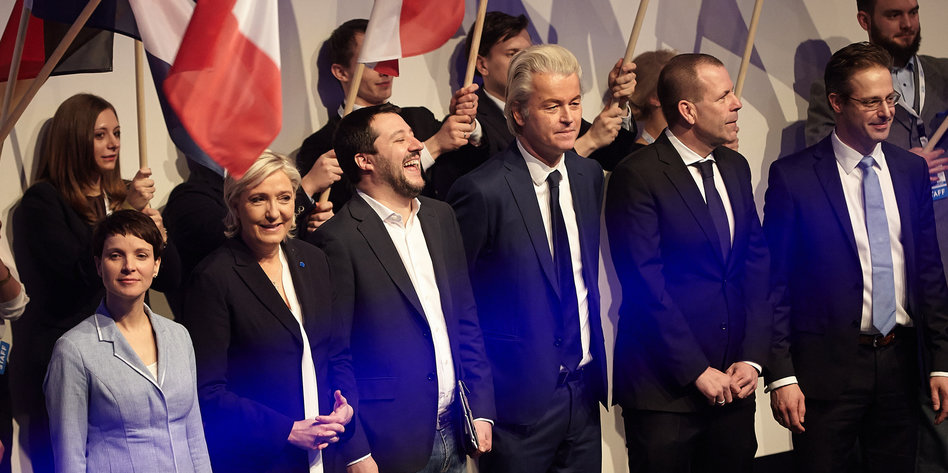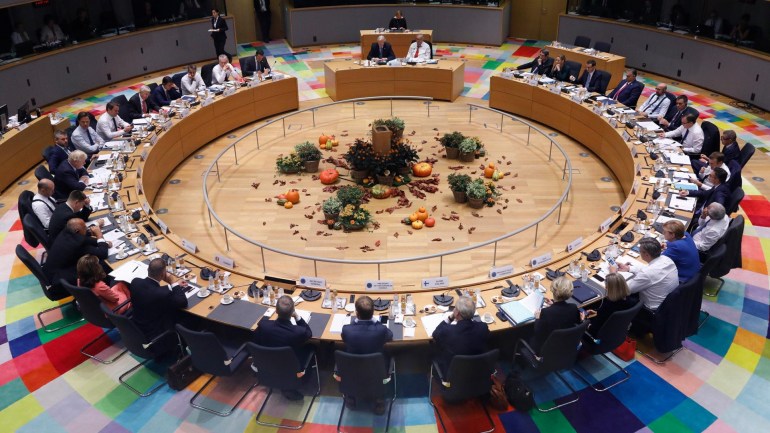
[authorbox authorid=”85″ title=”The Author”]
[toggler title=”DISCLAIMER” ]All opinions in this column reflect view of the autor(s), not of Vocal Europe.[/toggler]
Aspectrum is around Europe. Indeed, it goes beyond its borders and embraces the West. This spectrum – over a century and half after Karl Marx – is called populism.The reasons are many, often typically local and geolocated, but have common aspects and characteristics. And very deep roots.
Populism is not primarily a pathology of Western systems, nor an extemporaneous phenomenon destined to disappear quickly. The populism that crosses the West is not a single movement, nor a syntax of political communication, but rather an instrument of aggregation of consensus to use the popular vote for a radical transformation of the democracies that we know.
If we look at the processes underway in the complex of Western democracies, we can clearly see many common characteristics. The first is that they are processes that appear as “recent protest movements” but that actually originate at least thirty years ago. The second is that they are all movements that define themselves as post-ideological and against traditional parties.
The third is that almost everywhere these movements arise from struggles against supranational institutions (in the US against the federal government, in Europe against the European Commission and Parliament) in general against economic and fiscal policies.
The fourth is that everywhere the lifeblood of these movements comes from those social classes normally represented by the “left”, and that are those that have mostly paid the crises that have occurred in the last thirty years.
The fifth common characteristic is that, almost everywhere, this movement of substantial protest is characterized by feelings of “closure”, in each country with its specific declensions: in the United States against Mexican immigration and the delocalization of production, in Europe against east, China and against the various phenomena of immigration (without any distinction between economic migrants, war migrants, refugees seeking asylum). This fifth feature brings with it another: the strengthening of the typical positions of the “radical right”, even here with various and often new forms of declination.
We go from Albadorata in Greece, with neo-fascist positions declared openly, to the main parties of the neo-democracies of the East, which indistinctly assimilate positions also pro-Nazi. In between the French and Italian positions represented by the National Front of Le Pen and the Lega of Salvini, which perfectly embody all six elements we have spoken of.
Finally to the United States, where the election of Trump was determined electorally by the decline of voters, disillusioned by politics, with twenty million voters less than four years ago, and by the move on the American tycoon of a large part of the middle class , which although it is not in a state of real poverty, has seen a sharp reduction in its own welfare and purchasing power and that perceives its future as precarious and unstable.
In the midst of all this there are some positions that we could consider “atypical”, but which fall within the general framework that we have described. We have the British UKIP, author of what we could define the first “victory on the field” of this global movement, or the exit from the European Union of Great Britain. A referendum born of a populist spot of Farage (according to which emerging from the Union would have returned “to the glories of the past”) and an even more populist response and distant from the real-politik of Cameroon, which for reasons of personal propaganda election “promised” the referendum.
In Spain, due to both the role of the monarchy (which has not been exempt from being touched by the investigations on corruption), both the indepenentist parties (according to various declinations) and also for the only fascist-inspired right dictatorship not terminated with the end of the Second World War, the result was unique: on the one hand the political stalemate of the traditional parties, on the other the birth of two distinctly expressly populist parties, or Ciudadanos and Podemos, which from the right and left national-popular leadership is contending.
Finally, Greece, where the historical parties were literally wiped out to give way to a substantial monocolour of Syriza, the party of “radical left” of Prime Minister Tsipras, grew enormously as a response to the growth (and risk) of Albadorata. To these cases Italy is added with the case of the Movimento 5 Stelle, founded by the comedian Beppe Grillo. And this case is emblematic of many of the paradigms I have described before.
The moment of greatest impulse the M5S has had with the demonstrations of the square called “Vday”, or moments in which, from a stage, were publicly put to the sedan and tried and ridiculed the most famous politicians.
The political positions of the movement are the most general possible, able to “aggregate” literally anyone. They range from ecological and environmentalist battles, to openly declared electoral promises such as “income for all” and the abolition of the tax collection agency. The movement has an electoral base mostly coming from the disappointed parties left historically, and also socially and economically fed by the population groups typically represented by the traditional left.
In a combination that has equals only with the origins of fascism (it must be remembered that Mussolini was born and formed in the socialist party, socialist was the rhetoric and socialist-trade union the original program of fascism) the hard and most active core of the M5S is clearly right.
It is not a coincidence that in the European Parliament the representatives of the M5S are in the same parliamentary group as the Swedish Nazis, the UKIP of Farage, and the right-wing movements of Eastern Europe. Outside for reasons of historical belonging (but with many occasions of joint vote), from the large group of the extreme right that is headed by Salvini-Le Pen, with which they converge on issues such as the exit from the euro and the fight against immigration.
Starting from these common characteristics also helps us to trace the origins of this phenomenon. Historically, the end of the Cold War marks the beginning of a post-ideological society. The need to stay on one side or another for superior geopolitical reasons is lacking and new scenarios and new syntax of social narration open up. From another perspective it is the same society that changes, with a speed dictated by technological advances, by web, by networks and by telecommunications. With globalization, new ways of being together are also born.
[button color=”red” size=”big” alignment=”none” rel=”follow” openin=”samewindow” url=”https://www.vocaleurope.eu/?s=populism”]Curious for More?[/button]
It is the European Union, with the free movement of goods and people, to mark the passage of a world that has definitely changed. The Federation of States, with borders, laws and supranational bodies, is substituted for the State-Nation model with its own defined borders.
In this process that goes through the society at exponential speeds dictated by integration, technology, the fall of barriers and tariffs, and the free circulation of ideas, knowledge and information, traditional political parties – and even worse ideological schemes – progressively fail to their own institutional reason for being: to interpret society and to represent it institutionally and in legislative bodies. The figure of this distance lies in the slowness and backwardness of legislation regarding new technologies, privacy, big data, networks, data centers and social networks.
The right-left dichotomies are less in the languages, in a political communication tended more to chase the other’s electorate, without taking into account where a society was ever less represented and increasingly afraid of a changing world. Left-wing parties, which traditionally had to explain reality and protect the rights of the lower classes, pursued the middle class, and perched in defense of national productions without realizing that delocalization was a simple redistribution of production. Right-wing parties, which traditionally had to defend the free market, turned into defenders of protectionism and nationalism, taking care of the middle class only with electoral promises in tax matters.
The failure of both lies in the intellectual class of reference, which, unable to explain the direction that was taking the world, helped to power political parties more and more organ of representation of pieces of power and parts of the state.
ın other words, unable to sell themselves on the new market, they wanted to go back to the old one. Both – conservatives and reformists – self-referential and defenders of position income. In this scenario, what is lacking is the authority of those who hold public offices: no longer an elite able to represent society at best, but “anyone can do anything”, especially when – overwhelmed by the investigations on the corruption of the years Ninety in almost all of Europe – elected politicians show the worst part of politics.
The question is serious and profound and concerns the “where the occidental democracies are going”. Or what is the final direction of this transformation of democracy itself, as we know it. As in the second half of the nineteenth century the empires were not a system adequate to the times, and as the monarchies were not in the first half of the twentieth century, the current forms of democracy are not adequate to govern a globalized and interconnected world.
The modern forms of communication and the new speed that the media have taken on are ill-suited to forms of parliamentary government typical of the last century. It is probable that the direction that will take the forms of State and Government will be more and more similar to the American one, with closed bipolar systems, with parties linked to electoral cycles, and increasingly more scalable.
We will go to a world where we will lose most of the typical political daughters of the history of the individual nation states, and towards a model in which governments, all elected almost in the same way, with systems that are not the same at least similar, will have greater decision-making powers , and whose representatives will speak from peers and homologues among them more and more often in supranational structures and institutions.
In some ways we are moving towards the globalization of politics, systems of government and representation. Like it or not certainly more suitable to govern participating countries of a globalized world, but also to represent strong opposing interests, declared and deployed in the light of the sun, and protagonists of political life and not just lenders and conditioning economic choices.
In this process, certainly slower because it is not the result of a world war, populist movements play an important role in the deconstruction of the old system. At the same time they are destined, for physiological reasons, not to be the protagonists of what is to come. Or they will reciclect themselves in this or that part, converting themselves to real party structures, or they will be “a transitory piece” of this destructuring.
But they will leave deep traces in politics and communication, which can not fail to take into account the languages, times and syntax of this new aggregation of consensus, made of web, virality, slogans, capable of at least “climbing” the structures of politics.



